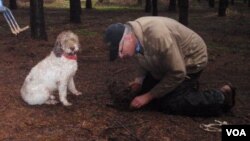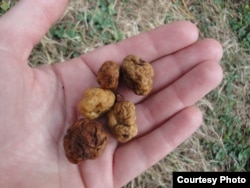MARION COUNTY, OREGON —
Mia MacCollin doesn't contain her excitement when her dog, a black Labrador mix named Boston, finds the buried treasure he's been looking for: the native Oregon white truffle.
These unique mushrooms, which grow underground near the roots of trees, can fetch hundreds of dollars per kilogram at retail.
Mia and Boston are finishing up a two-day course in truffle foraging at a Douglas fir plantation south of Salem. MacCollin and 15 other dog owners have each paid nearly $600 to attend.
In France, truffle hunters historically relied on the keen noses of pigs, while Italy is home to a special breed of truffle dog. In the United States, a small cadre of dog trainers and truffle lovers promotes the use of all sorts of breeds.
Trainer Deb Walker says a dog is far better than a man with a rake when it comes to uncovering truffles. But it can take up to a year to fully train a truffle dog. Although some can pick up the basics in a matter of days.
"It's easy to teach a dog the truffle scent and to find it," Walker says. "The hard part is teaching the dog to tell you when he's found it, not to eat it when he's found it, [and] to keep working for an hour or two."
Truffle lovers have difficulty describing the earthy allure of the forest fruit. The underground mushrooms can range from the size of a pea to a golf ball.
They remind Gold Beach, Oregon, chef and tree farm owner Janet Snazuk of the nuances of fine wine.
"The taste is like nothing that you've ever experienced," she says. "It's got an oil that permeates and stays with you. It's exotic."
Ripe Oregon white truffles are often described as having a nutty, earthy taste. Others compare it to menthol and pine. An Oregon brown truffle can be garlicky, and the rare black truffle can release heady aromas of pineapple, port wine, chocolate and dirt.
Truffles from France and Italy still command a premium price in the marketplace. But new exporters are emerging onto the scene.
Some Australian farmers have successfully cultivated European truffle varieties on a commercial scale, while the Chinese are making the biggest splash by shipping greater volumes at more affordable prices.
International competitors knock the Chinese for using rakes instead of animals to uncover their truffles. Actually, the mechanical harvest method is common in the U.S., too.
But dog trainer Jim Sanford believes that using rakes is indiscriminate and leads to waste.
“My feeble human nose cannot differentiate as well as a dog between a ripe truffle and an unripe truffle," Sanford says. "If you’re just blindly taking them out of the ground with a rake, by the time you disturb them, if they aren’t ripe you can’t put them back. They’re never going to ripen. That’s just kind of how that is.”
That’s one reason instructor Sanford foresees a growing demand for trained canines, especially as more landowners in the Pacific Northwest set up truffle plantations.
"The truffle industry, if you can call it that, here in the Northwest, we've barely scratched the surface," he says. "There's a huge abundance of truffles and there will be a huge need for truffle dogs. I think it's going to get exponentially more popular."
These unique mushrooms, which grow underground near the roots of trees, can fetch hundreds of dollars per kilogram at retail.
Mia and Boston are finishing up a two-day course in truffle foraging at a Douglas fir plantation south of Salem. MacCollin and 15 other dog owners have each paid nearly $600 to attend.
In France, truffle hunters historically relied on the keen noses of pigs, while Italy is home to a special breed of truffle dog. In the United States, a small cadre of dog trainers and truffle lovers promotes the use of all sorts of breeds.
Trainer Deb Walker says a dog is far better than a man with a rake when it comes to uncovering truffles. But it can take up to a year to fully train a truffle dog. Although some can pick up the basics in a matter of days.
"It's easy to teach a dog the truffle scent and to find it," Walker says. "The hard part is teaching the dog to tell you when he's found it, not to eat it when he's found it, [and] to keep working for an hour or two."
Truffle lovers have difficulty describing the earthy allure of the forest fruit. The underground mushrooms can range from the size of a pea to a golf ball.
They remind Gold Beach, Oregon, chef and tree farm owner Janet Snazuk of the nuances of fine wine.
"The taste is like nothing that you've ever experienced," she says. "It's got an oil that permeates and stays with you. It's exotic."
Ripe Oregon white truffles are often described as having a nutty, earthy taste. Others compare it to menthol and pine. An Oregon brown truffle can be garlicky, and the rare black truffle can release heady aromas of pineapple, port wine, chocolate and dirt.
Truffles from France and Italy still command a premium price in the marketplace. But new exporters are emerging onto the scene.
Some Australian farmers have successfully cultivated European truffle varieties on a commercial scale, while the Chinese are making the biggest splash by shipping greater volumes at more affordable prices.
International competitors knock the Chinese for using rakes instead of animals to uncover their truffles. Actually, the mechanical harvest method is common in the U.S., too.
But dog trainer Jim Sanford believes that using rakes is indiscriminate and leads to waste.
“My feeble human nose cannot differentiate as well as a dog between a ripe truffle and an unripe truffle," Sanford says. "If you’re just blindly taking them out of the ground with a rake, by the time you disturb them, if they aren’t ripe you can’t put them back. They’re never going to ripen. That’s just kind of how that is.”
That’s one reason instructor Sanford foresees a growing demand for trained canines, especially as more landowners in the Pacific Northwest set up truffle plantations.
"The truffle industry, if you can call it that, here in the Northwest, we've barely scratched the surface," he says. "There's a huge abundance of truffles and there will be a huge need for truffle dogs. I think it's going to get exponentially more popular."





